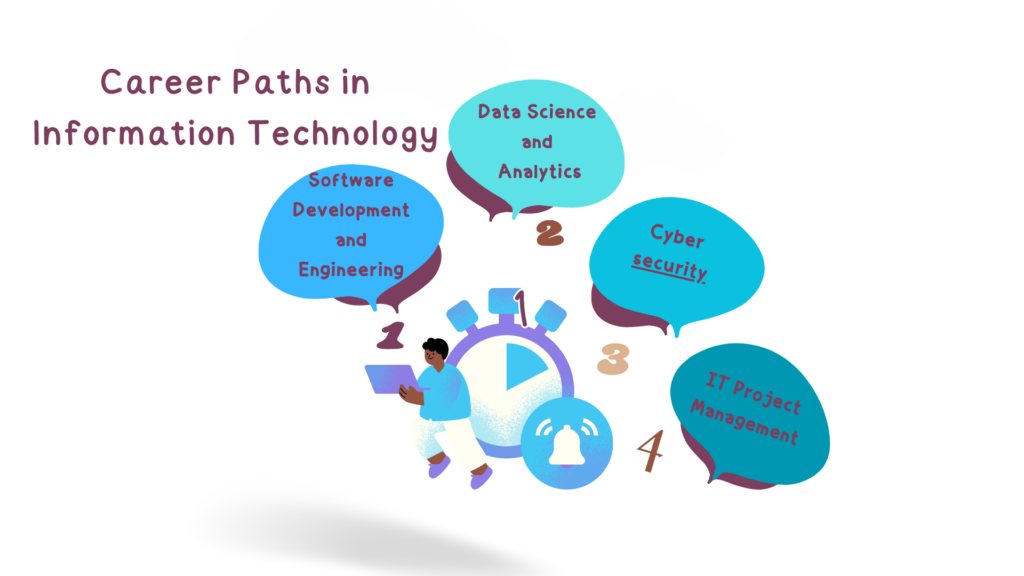Information technology (IT) has become an integral part of our lives, revolutionizing the way we work, communicate, and access information. From the computers we use to the networks that connect us globally, IT has transformed the world into a digital landscape. In this article, we will explore the vast field of information technology and unlock endless possibilities with a rewarding career in Information Technology. Discover lucrative opportunities and shape the future of technology today
Various Fields within Information Technology
Information technology encompasses diverse fields, each contributing to its overall landscape. Computer science and programming are at the core of IT, with different programming languages and software development techniques being utilized for creating applications, websites, and mobile apps. Network administration and security professionals ensure the smooth functioning and protection of computer networks, addressing cyber threats and data privacy concerns. Database management and analytics experts handle the organization, analysis, and visualization of large datasets, providing valuable insights for businesses. IT project managers oversee the planning, execution, and successful completion of technology initiatives.
Education and Career Opportunities in Information Technology
For those interested in pursuing a career in IT, there are numerous educational pathways to explore. Bachelor’s degree programs in information technology offer a comprehensive foundation in the field, covering subjects such as programming, database management, networking, and cybersecurity. Master’s degree programs provide advanced knowledge and specialization in specific areas of information technology, equipping graduates with the skills to lead and innovate in the industry. Additionally, diploma and certification courses offer a more focused and practical approach, allowing individuals to quickly acquire specific skills for entry-level positions or career advancement.
When it comes to quality education in information technology, several notable institutions stand out. The Indian Institute of Information Technology (IIIT) is renowned for its rigorous curriculum and cutting-edge research, offering a wide range of undergraduate and postgraduate programs. The International Institute of Information Technology (IIIT) is another esteemed institution known for its emphasis on interdisciplinary learning and industry collaboration. The Institute of Information Technology and Management (IITM) focuses on practical skills development and offers programs tailored to the needs of the industry.
A career in information technology presents abundant job prospects and competitive salaries. The IT industry job market is continuously expanding, with a growing demand for skilled professionals across various domains. Some of the in-demand roles include software developers, network administrators, cybersecurity analysts, data scientists, and IT project managers. The salary ranges in India vary based on experience, qualifications, and job responsibilities. However, information technology jobs often offer attractive compensation packages that reflect the value of the skills and expertise required in the field.
Career Paths in Information Technology
The vast landscape of Information Technology offers a multitude of career paths catering to diverse interests and skill sets. Let’s explore some prominent paths:
Software Development and Engineering:
a. Front-end development: Creating user interfaces and experiences using HTML, CSS, and JavaScript.

b. Back-end development: Building the server-side logic and databases to power web applications.
c. Full-stack development: Combining front-end and back-end skills to develop end-to-end web solutions.
Data Science and Analytics:
a. Data analysis and visualization: Extracting insights from large datasets and presenting them in a meaningful way.
b. Machine learning and predictive modeling: Developing algorithms and models to make data-driven predictions and recommendations.
Cybersecurity
a. Threat assessment and prevention: Identifying vulnerabilities and implementing measures to safeguard systems and networks.
b. Security infrastructure management: Designing and managing secure network architectures and implementing protocols for data protection.
IT Project Management:
a. Planning and coordination of technology projects: Ensuring successful execution of IT initiatives within defined timelines and budgets.
b. Team management and resource allocation: Leading cross-functional teams and optimizing resource utilization.
Educational Paths and Certifications
When embarking on a career in Information Technology, choosing the right educational path is crucial. Traditional university education offers bachelor’s degrees in Computer Science, Information Systems, or related fields. These programs provide a comprehensive understanding of IT principles and offer hands-on experience through projects and internships.
Alternatively, online learning platforms have gained popularity, providing flexible and accessible education options. Online courses and boot camps cover various IT domains and often focus on practical skills development. Certifications from renowned organizations like Cisco, Microsoft, or CompTIA can also enhance your credentials and demonstrate specialized expertise in specific IT areas.
Job Market and Salary Potential
The job market for IT professionals is thriving, with a growing demand for skilled individuals across industries. Companies are increasingly investing in digital transformation, creating a plethora of employment opportunities. According to industry reports, the demand for IT professionals is expected to continue rising in the coming years.
Salary potential in the field of Information Technology is highly competitive. Salaries vary depending on factors such as job role, experience, location, and industry. Entry-level positions typically offer a solid starting salary, and as professionals gain experience and expertise, they have the potential to earn significantly higher salaries. In-demand specializations such as data science, cybersecurity, and cloud computing often command higher pay due to their strategic importance to organizations.
Industry Trends and Emerging Technologies
Information Technology is a dynamic field that continually evolves with new trends and emerging technologies. Staying abreast of these developments is crucial for IT professionals. Some notable trends and technologies shaping the IT landscape include:
- Cloud computing and virtualization: Cloud-based services and virtualization technology enable organizations to scale their infrastructure, increase efficiency, and reduce costs.
- Internet of Things (IoT) and connected devices: The interconnectedness of devices allows for seamless data exchange and automation, leading to improved efficiency and enhanced user experiences.
- Blockchain technology and cryptocurrency: Blockchain, a decentralized and secure ledger system, has found applications beyond cryptocurrency, such as supply chain management, healthcare, and finance.
- Augmented Reality (AR) and Virtual Reality (VR): These immersive technologies are transforming industries like gaming, education, and retail, creating new opportunities for IT professionals.
Tips for a Successful IT Career
To excel in your IT career, consider the following tips:
- Continuous learning and staying updated: The IT industry moves at a rapid pace, making continuous learning essential. Stay updated with the latest technologies, trends, and industry best practices through online courses, conferences, and networking with peers.
- Building a professional network: Networking is invaluable in the IT industry. Attend industry events, join professional organizations, and engage with online communities to connect with like-minded professionals, gain insights, and explore career opportunities.
- Gaining practical experience: Internships, personal projects, and open-source contributions can provide valuable hands-on experience and showcase your skills to potential employers. Emphasize practical achievements and highlight them on your resume and portfolio.
- Developing a strong online presence and personal brand: Create a professional online presence through platforms like LinkedIn and GitHub. Showcase your projects, share insights, and engage with the IT community. A strong personal brand can attract opportunities and help you stand out in a competitive job market.
Challenges and Future Outlook
While the IT field offers immense opportunities, it is not without its challenges. As technology evolves, automation may disrupt certain job roles, requiring professionals to adapt and acquire new skills. Additionally, the industry needs to address diversity and gender gaps, fostering inclusivity and equal opportunities for all.
Looking ahead, the future of Information Technology holds exciting prospects. Emerging roles, such as AI ethics specialists, data privacy officers, and quantum computing experts, are expected to gain prominence. Continued advancements in fields like AI, cybersecurity, and data science will shape the industry and create novel opportunities.
Conclusion
Information technology plays a vital role in our modern world, driving innovation, efficiency, and connectivity across various industries. It has transformed the way we live and work, enabling us to access information, communicate globally, and solve complex problems. The field of information technology offers vast educational opportunities, from degree programs to certification courses, empowering individuals to acquire the skills needed to thrive in the industry. With a wide range of career options and competitive salaries, information technology presents a promising path for those passionate about technology and its endless possibilities. As we embrace the future, staying updated with the latest trends and innovations in information technology will be crucial to unlocking new opportunities and contributing to a digitally-driven world.





